Composer / Pianist Elinor Remick
Warren
A Conversation with Bruce Duffie
Back in the pre-internet days, when there was no e-mail nor video-chatting
via Skype, communication was done mostly by letter (now called snail-mail)
and telephone (now called land-lines). It was in this now-cumbersome
manner that I made contact with composer Elinor Remick Warren. I was
working for WNIB, Classical 97 in Chicago, and asked her to do an interview
with me on the phone. She was reluctant at first, but finally agreed,
and we spoke for about an hour early in 1987. In the end she was pleased,
and I was able to present her music and thoughts on the air. After the
first of these programs, I sent her an air-check cassette, and the second
letter shown below is her lovely response.
As this conversation is being prepared for my website presentation in the
spring of 2016, we have pretty much gotten to the point where gender is mostly
irrelevant — save for the ongoing surprise of some in the audience
when they realize a work has been written (or is being conducted) by a woman.
Even when this interview took place (almost thirty years before), the bias
and equality issues were well on their way to being eliminated. I mention
this simply to say that we discussed it first to simply dispose of the topic,
after which we moved along to the standard discussion about composition,
technique, philosophy, performances, etc. . . . . . . . .
Bruce Duffie:
First, let me ask you about your name. How do you wish me to refer
to you on the air?
Elinor Remick Warren:
I’d rather you use Elinor Remick Warren. I wrote my first piece when
I was still in high school, so I started out as being Elinor Remick Warren,
and still am Elinor Remick Warren. Though I’m very happy to be Mrs.
Wayne Griffin, and socially of course I use nothing but that, but professionally
I have always used Elinor Remick Warren. I’ve kind of wished sometimes
that I had been wiser about it. If I had been a little older I would
have thought about that and called myself Remick Warren, because then it would
not be designated purely as a woman. I’ve had trouble with publishers.
Two publishers put ‘E. R. Warren’
on the cover, and when I asked about it they said that people like to not
designate me as a woman. This was some time ago, and fortunately that
is changing.
BD: Would you
rather be known as a woman composer or just a composer?
ERW: I don’t
like to be pigeon-holed. [Both laugh] You’re a composer or you’re
not a composer, and I prefer to be known as a composer — although
I’m very proud to be a woman composer. I like being a woman very much,
and I like all the joys and fullness of life that has brought me
— having my family and children, and my wonderful husband for so
many years. In a way I think it’s unfortunate if too many people are
just classified as ‘Women Composers’,
and there are too many concerts of just women composers. This puts you
off in a little niche.
BD: Are things
getting better for the woman composer?
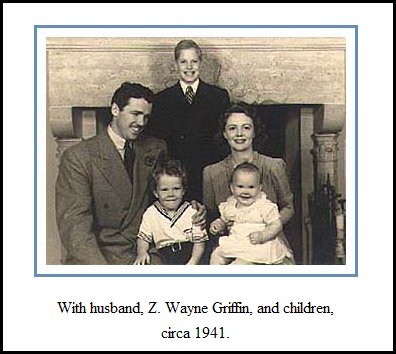 ERW:
Oh, I think so, yes. Maybe that’s a good thing but I don’t like it any
more than I would like any kind of segregation. I’m very proud to be
a woman but I don’t like to be viewed just as a ‘woman composer’.
ERW:
Oh, I think so, yes. Maybe that’s a good thing but I don’t like it any
more than I would like any kind of segregation. I’m very proud to be
a woman but I don’t like to be viewed just as a ‘woman composer’.
BD: You are a
composer and pianist. Are you also a teacher?
ERW: No, I’ve
never taught. I don’t think I have that talent. That’s a distinct
talent. As a child growing up I had a wonderful teacher, and I think
that’s a gift which can be imparted to people. I don’t think I’d be
a very good teacher. I don’t know the techniques for teaching.
I never had to teach. My husband was a businessman, and I didn’t have
to teach. I really didn’t have time to teach. I had three children
to raise...
BD: Were you
composing all that time?
ERW: Oh, yes,
all the time.
BD: How do you
balance the demands of a family and the demands of composing?
ERW: God was
good to me for the wonderful husband I had for forty-five years, whom I just
lost in 1981. He was very, very musical himself — a
good musician, though not professionally. He had studied music and had
a lovely voice, and he was tremendously interested in doing everything to
help me.
BD: So he was
very supportive then?
ERW: Oh, very,
and I was supportive of him. He was a business man, and earlier he was
a producer of radio, and later television. He was just knowledgeable
of music, and he produced programs until he had to take over my father’s business.
So I didn’t have to teach, and I composed because I loved it. I loved
to compose. I composed not to make a living, fortunately, because it’s
a little rough. A lot of people are good teachers, and they have the
ability to teach. That’s very fortunate for the people who can study
with them, but I never thought of teaching. I’ve been asked to teach
lots of times, including by my own grand-children, but no, no, no!
I don’t have time.
BD: Just as a
general idea, is musical composition something that can be taught or must
it be innate?
ERW: The techniques,
of course, and certain things can be taught, but I don’t think you can teach
a person to compose. When I was in high school, we had to write a lyric
and we had to write a sonnet, and I learned how to do it. There’s a
certain technique, even in novels. There a certain form that must be
solid, and you can teach form and harmony and all that, which gives one a
great understanding and enjoyment of music. But I don’t think you can
teach someone to compose, other than just as an example of how to learn
and appreciate others composing. It has to be instinctive to be a good
composer. One must have some knowledge of form and counterpoint and
orchestration, but you can’t be armed with all that study and then be just
expected to produce things that are going to be interesting.
BD: Where is
the balance between inspiration and technique?
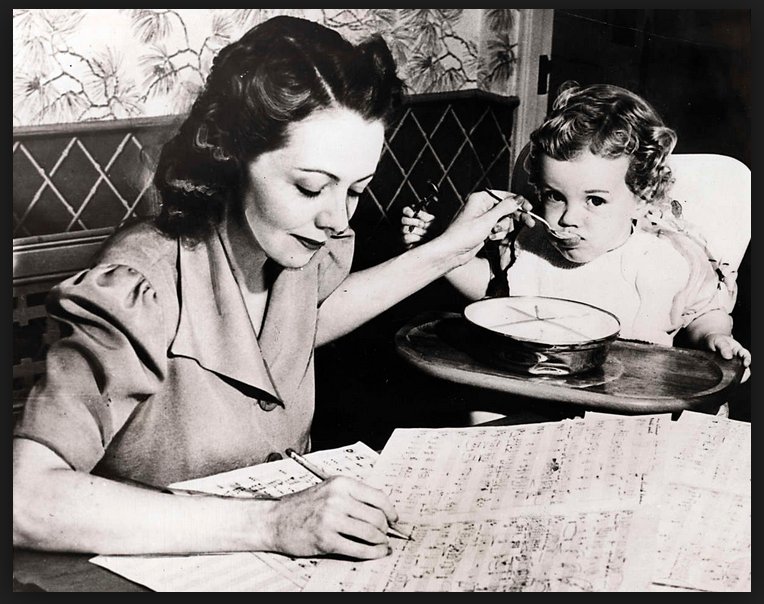 ERW: You have to have inspiration to be a good
composer. I felt it so much that there were times when I’ve been writing
— even when my children were little so I had lots of other demands
— that I could hardly wait for the next day to begin working
again. There was something I felt that was inside that I had to express,
that I wanted to write. It’s always been a joyful experience for me.
ERW: You have to have inspiration to be a good
composer. I felt it so much that there were times when I’ve been writing
— even when my children were little so I had lots of other demands
— that I could hardly wait for the next day to begin working
again. There was something I felt that was inside that I had to express,
that I wanted to write. It’s always been a joyful experience for me.
BD: These are
things that you had felt you had to write, but you’ve also gotten many commissions?
ERW: I have some,
yes, but I’ve turned down some too because I didn’t ever want to write to
order. Sometimes someone would give me a commission, and if it appealed
to me I would say yes. But I’ve turned down quite a few because I just
didn’t think they were right for me. For instance, there was a commission
that was quite interesting for a ballet, but I don’t know enough about the
techniques of ballet, and at that time I didn’t feel that I was interested
that much in getting into it. I have written a lot of things upon request,
and for certain conductors, and also real big commissions, but I didn’t do
it because I had to earn the money. I’ve written because I loved it
and I wanted to write. I’ve been writing since I was five years old.
BD: So when you’re
writing a piece you don’t have the pressure of deadlines?
ERW: Well, sometimes
you do, yes! There is always somebody who wants to do the work in the
May Festival, and it’s already March! [Both laugh] So if you think
you can do it, fine, if it hits you that strongly right away. But I
don’t think that it can be done like doing a page of mathematics for tomorrow’s
lesson. Nothing like that.
BD: Have you
ever come upon a deadline and felt that the music wasn’t ready yet?
ERW: I’ve come
a little close to it once or twice! But they’ve worked out all right.
I’ve usually tried to allow myself enough time so I wouldn’t be so pushed.
I could have done a greater quantity if I hadn’t had my family and certain
responsibilities that came with it. My family always was first.
BD: Is that the
way it should be?
ERW: It should
because in my case they’ve been so supportive. I remember one time I
caught my husband saying to the children when they were young, “Now
remember, if you break a leg, then
you can go and call your mother from her studio; but otherwise you don’t
dare call her!” [Huge laugh]
They’ve been very helpful. My family’s just been wonderful.
* *
* * *
BD: When you’re
writing a piece of music, how do you know when it is finished?
ERW: It seems
you have a certain form in mind from the start. You have a plan, and
you work through it and carve it. I just never question how would I
know. I just know!
BD: Do you ever
go back and revise your scores?
ERW: Sometimes.
I’ve heard my music and thought, “Oh this is going to
work out to a wonderful climax.” Then they go
on and it never seems right. I’m a tinkerer, I’m sorry to say.
But I’ve done a lot and learned a lot by doing this, and finally the time
comes when you have to say, “Now this is done and you’re
not going to do any more.” But you keep looking
at it with an inquiring mind, and so I have made revisions which I’ve felt
I’m very glad I did.
BD: Was this
before or after the first performance?
ERW: Both.
There was one work that was done in Greece with the Athens Symphony Orchestra
and the Metropolitan Singers. It’s a long work, a big work, and I just
wasn’t satisfied with it. I didn’t have time to revise it because too
many things came to interrupt it. I was asked to write this or that,
but several years later I did revise the whole thing. Usually performances
are a great help. They are great teachers, and that’s the composer’s
dilemma because so often they don’t find opportunities to hear their works.
I’ve been very fortunate and I’ve heard some by lesser orchestras and some
by great orchestras, and I’ve always felt I’ve learned from it.
BD: Have you
generally been pleased with the performances you have heard of your music?
ERW: Well, of
course, the better the musicians that are doing it, the more pleased I am,
naturally. [Laughs] They vary, especially the singers, but sometimes
the college groups give very excellent performances, too. I’ve been
very fortunate in having a number of my works for chorus, and for chorus
with orchestra, sung so much that I’ve learned a lot about composition in
general. In fact, I learn about the vocal line from hearing them, too.
You have to keep going. You want to keep going, and the more you do
them, the better it gets.
BD: Do performers
ever find things in your scores that you didn’t know where there?
ERW: I hope I
know my own works well enough that there are few surprises.
BD: So you are
never surprised by what you hear?
ERW: I’m surprised
at the performances sometimes, but not with the music.
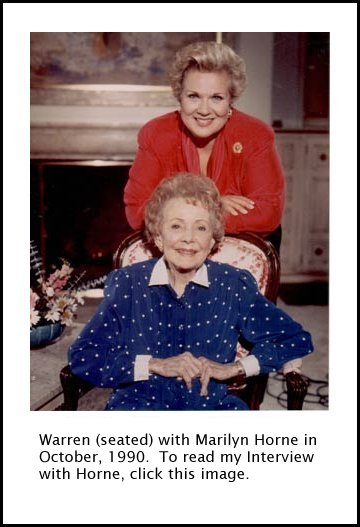 BD: Let’s talk about singers. You write
a lot for the voice...
BD: Let’s talk about singers. You write
a lot for the voice...
ERW: Yes, I have.
The reason I was attracted from the start was I always wanted to be a singer,
and I love singing. I’m very fond of it, and heard so many wonderful
concerts that my mother and father took me to hear as a child. I always
wanted to sing but I don’t have a voice! So I think that’s why I turned
to writing for the voice, simply to learn more about the techniques of it.
Then when I first went to New York and was studying there, I was very fortunate
in playing either as piano soloist or accompanist for a good number of very
great Metropolitan singers. I learned so much just from hearing them
and knowing the principles of vocal music. I found out what was practical
and what wasn’t, and because they had their own techniques you have to think
about in writing for the voice. I found it very, very helpful.
BD: Who were
some of the great names that you played for?
ERW: Lawrence
Tibbett, Richard Crooks, Florence Easton, Bidú Sayão, Rose
Bampton... lots of people. [See my Interview Bidú Sayão,
and my Interview with Rose
Bampton.] I learned a great deal from association with them too,
not always just playing for them, but hearing them sing my songs. I’ve
learned a lot about how one can go, and what is their possibilities and their
problems are. Human voices are very fragile things, and you have to
think constantly of their technical demands and all their problems.
And of course, in a song it’s important to choose the right words that are
singable. You can’t just set any poem because you happen to like the
poem. It has to be somewhat singable. The words have to be projected.
You have to write them so that the singer can project them, otherwise it’s
no good. The listeners have to get it the first time they hear it,
so it means the singer has to have very singable songs. They choose
them that way.
BD: As accompanist
of your own works, are you the ideal interpreter of your own music?
ERW: Well, I
don’t know. That’s for other people to decide. Of course, on
this new recording that I’ve just done there are twenty-six of my songs,
and they keep saying that they will be the definitive recordings! I
don’t know... maybe somebody did do it better, but I think that it’s interesting
to have the composer’s interpretation. Usually I’ve always found singers
wanting to say, “Now tell me about this! What
do you want down here? How do you feel about the tempo?”
They usually want the composer to offer suggestions.
BD: Do you offer
them?
ERW: Yes!
Yes, I do. I offer ideas such as, “This is a little
fast,” or, “I think it should
go along,” or the way I feel about the interpretation.
I don’t say this must be done so-and-so because I think everybody has to have
their own individual expression too. That can happen even in orchestral
works, only there you’re not asked so much. You don’t have the opportunity,
and maybe they will see it differently. That’s interesting. The
conductor sets the interpretation, and I’ve been very fortunate in being pleased
with most of the ones I have heard.
BD: Staying with
the songs for a moment, do you ever write your own text?
ERW: No!
I must confess I did twice, but I used a nom de plume! [Laughs] It’s
where I just had to. They were circumstances where I had to write something,
so I did. But I never put my own name because I’m not a poet!
BD: What name
did you use, or do you not want to divulge that?
ERW: I used two
of my grandparents’ names in these cases. But it doesn’t make any difference
about that because it wasn’t as if I was trying to deceive anyone. But
I do not claim to be a poet. These are just two isolated cases of mine
among ninety some publications. Many people have asked me if I write
the words, too, but I’m not a poet! I’m really inspired by the poem,
usually!
BD: You’ve written
so much for the voice. Have you written any operas?
ERW: No, I haven’t,
and there are several reasons. In the first place, it’s very hard to
find the libretto that one really wants to set. I have had numerous
ones sent me, and they just didn’t appeal to me. I haven’t really made
a great research to find something because I was so much more interested in
writing for orchestra and for the voice or for choral groups. I have
written more choral things than anything, I think. Also I think it’s
harder to get your works done if they involve so many people. In an
opera there are the singers, the staging, the orchestra, so much that it’s
very difficult. Composers have a difficult time getting their things
heard, and it’s tripled by being a woman. And they can be terribly expensive.
BD: Do you feel
that opera is a dying art?
ERW: Oh, no,
no! I just personally haven’t loved to write for operas so much.
I suppose if I’d found a libretto that really appealed strongly to me, I
would have. You don’t just write to have things done and produced.
BD: For whom
do you write?
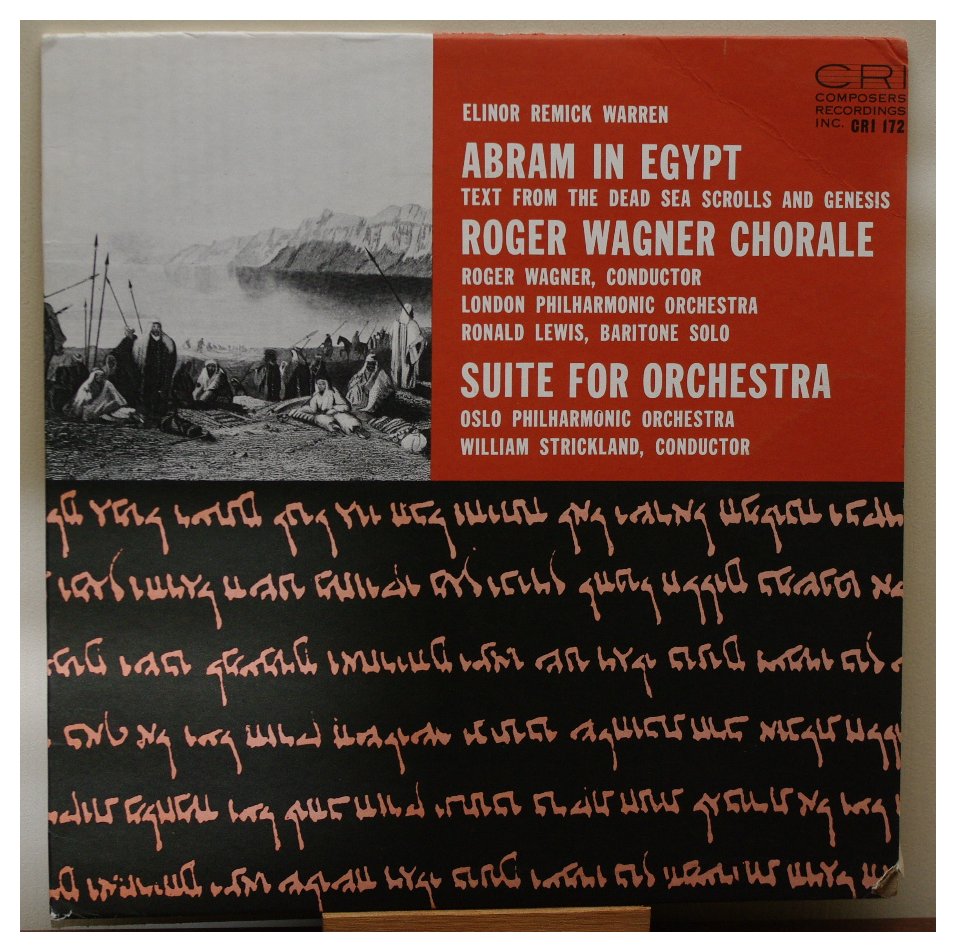
ERW: I write
because I want to write. I just feel like composing, and I compose.
When I’m asked to write for this group or that group, or this person or that
person, then I’m looking for something along that line. My Abram in Egypt was brought to me by a
very, very prominent businessman, Louis Sudler, who was also a fine musician
in Chicago. [Sudler sang the first
performance (as a solo cantata) conducted by Thor Johnson. The first
performance in its form with chorus was June 7, 1961 at the Los Angeles International
Music Festival, with soloist Donald Gramm. (See my Interview with Donald Gramm.)] Sudler commissioned me to write
a work, and I looked into it, and I took it from the Dead Sea Scrolls. This was after
a new set of scrolls had been discovered, and they were fascinating.
This was a fascinating work of literature, and so I said yes, I’d like to
do it! But I really wanted to have a chorus in it, too, because it was
such a big thing. So I did write it, and I combined it with the same
story that’s in the Book of Genesis
in the Bible. The two together
made it complete because each part was rather incomplete in itself.
The one in the Scrolls is much
more poetical than the one in the Book
of Genesis, but the one in Genesis
completed it. So I put them together, which was a very interesting
experience. I enjoyed doing that. These scrolls were found at
the Dead Sea, and I always thought it would be wonderful to have this work
given there. It would be such a thrill, and it actually came about!
My husband and I went to Europe that summer, and on to Israel for the performance,
and it was really the most exciting experience, musically, that I had because
it was so connected with history and with good people. It was given
both in Tel Aviv and at the Caesarea in the ancient Roman Coliseum.
I was thrilled because it was given there where these ancient Scrolls were
found. There’s a museum in Jerusalem to house these Scrolls.
They have a beautiful building and are presented magnificently
— not just the part I set, but the whole set of Scrolls.
It was a thrill and it was a great success, I must admit. It has an
operatic feeling! The people couldn’t understand how I had happened
to write this piece because I don’t happen to be Jewish. But it was
a wonderful opportunity, and a very exciting adventure for me to write music
for these wonderful words. It was something different from what I had
done.
BD: Is the text
is sung in the original or in English?
ERW: It’s in
English. It was translated from the ancient Aramaic to Hebrew, and
then the part I set was translated from Hebrew into English, and it was given
in English.
BD: Was the [CRI
LP] recording was made around the same time?
ERW: It was made
about six months later by Roger Wagner in London. He has a chorus
there that he uses for that sort of thing, and with the London Philharmonic
Orchestra.
BD: So this recording
is a documentation of the performance in Israel?
 ERW:
No, it wasn’t made in Israel. It wasn’t with the same group entirely
either, but it was under Roger Wagner, who did it in Israel. But I had
nothing to do with the recording.
ERW:
No, it wasn’t made in Israel. It wasn’t with the same group entirely
either, but it was under Roger Wagner, who did it in Israel. But I had
nothing to do with the recording.
BD: On the other
side of the record is the Suite for Orchestra.
How did that work came about?
ERW: We have
a ranch in the High Sierras, and we look across the lovely vista [shown at right?]. It’s not a long
journey from my home, but when you get there you think you’re a hundred miles
from any place because you look out across the desert to the beginning of
the High Sierras. I don’t know what it is called, but we have such wonderful
cloud patterns there. I love the ranch, and we’ve spent a great deal
of our lives there and rode a great deal, and have been right out in this
wilderness where I would see all these wonderful clouds. I just felt
the music, and I have to express my emotions in music that way. So
that is what the Suite is all about.
I did find some poetry by John Gould Fletcher (1886-1950; Pulitzer Prize,
1939). I just happened to come across him, and I took a few lines for
the four movements of this Suite.
It is an expression of the way I feel at the ranch which inspired it.
The spaciousness has had a lot of influence on my music. I
felt a great spiritual closeness to all of this at the ranch, and it’s been
a source of lots of my music.
* *
* * *
BD: In your opinion,
what should the ultimate purpose of music?
ERW: I’ve never
really thought a lot about a purpose. I think it makes life so much
richer in the first place. I can’t imagine a life without music because
my life has been so involved in music, right from the earliest memories I
have of hearing my father sing and my mother play the piano for him.
As a very little girl I would creep out of bed and sit on the stairs and listen
to them make music in the evenings. All my life music has been such
an important part. For one’s spiritual fulfillment it is terribly important...
at least it is to me. Now there are a lot of people who just don’t
feel that way, but I do. Music enfolds so many avenues of thought
and of development in character, and I’ve just been glad to see it do that
in my children, and now even in my grandchildren a little bit, though they
haven’t had the opportunities and didn’t care to study as much about it as
I did. None of them are violently interested in music, [laughs] but
they are beginning to be.
BD: Where is
music going today?
ERW: This is
an age of experimentation, though all people would say that about ‘new music’
at their time. I remember Nadia Boulanger saying to me that all music
seemed new at the beginning as it would evolve and develop. But I think
there is more experimentation now than there ever has been. Sometimes
it seems as if it’s just as a matter of creating a novelty. But so
often what seemed so strange and experimental then becomes very understandable
if you hear it enough. They tell the story that Tchaikovsky didn’t have
any use for Brahms. He didn’t like his music at all. He thought
Brahms wasn’t nearly the composer that Anton Rubinstein was. You can’t
tell where it’s going or where it’s gotten, but it’s certainly growing all
the time, and going on as an expression of development. We have to
listen with open ears. Some people have written things just to write
something different and to be different. I don’t think that will last,
but so often that is a natural expression to strike new paths, and then it
becomes very understandable later.
BD: Are there
perhaps too many divergent styles being tried today?
ERW: This is
the age of trying and experimenting, more than it has been in the past.
It’s a good thing if it’s done sincerely and it holds up and becomes really
important. The sincerity with which it’s done means everything if it
isn’t just done just to write something to be different. It all depends,
but very often new and very different sounds develop, and then pretty soon
they come a part of the musical stream.
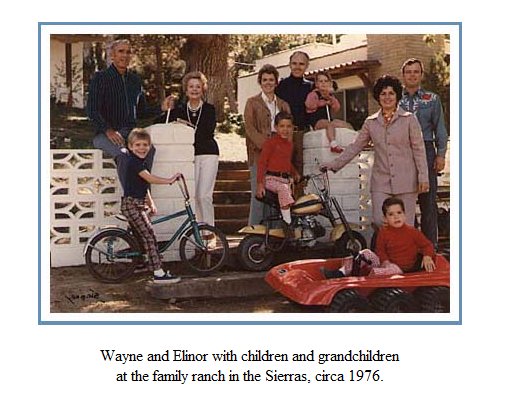 BD:
Do you feel that music is art or entertainment?
BD:
Do you feel that music is art or entertainment?
ERW: [Recalling
my previous letter] Oh, I knew you were going to ask that! I’m
not sure what you mean by entertainment. Do you mean it just as background
music or something like that?
BD:
I’m really looking for a balance. Where is the balance between the
art and the entertainment?
ERW: There’s
often music that seems maybe to be just entertaining, and it becomes important
later on if it lasts. Only time can tell that.
BD: You mentioned
your children and your grandchildren are enjoying music, but not to the extent
that you are.
ERW: They said,
“Mother, I’m never going to be a musician because you
work much harder than the cleaning lady!” [Both
laugh] I work all the time because I love it. I’m doing what I
want to do.
BD: Should the
concert management try to get the audience for popular music into the concert
hall?
ERW: What do
you mean by ‘popular music’? Do you mean rock and roll?
BD: Perhaps...
ERW: I personally
don’t love it, but I just need to say “Yes, it should
be!” For instance, a long time ago the music of
Gershwin was considered just jazz and entertaining, and now we realize it
was a distinctly new invention, a new form that he did, and it’s become a
classic. His Porgy and Bess
is an opera to be reckoned with, and very rightly so. It’s a wonderful
opera. Sometimes what is considered to be entertainment becomes important,
and other times things that are considered as important have died.
It’s only time that tells. That being said, I personally don’t see
how people can have background music going on and be thinking about other
things. It even disturbs me when driving in the car to hear good music
because I want to pay too much attention to the music rather than my driving!
I have to turn it off.
BD: You want
to concentrate just on the music!
ERW: Yes, I love
it and I only turn on the classical music station. It’s hard to say.
I think that what is entertaining has to be good to last, and what is good
should hold our interest. Recordings have done a lot to bring people
into listening to good music.
BD: You have
seen this tremendous proliferation of recordings. Is this a good thing
to have so many?
ERW: I don’t
know if it can all be supported or not, but I think it has done a lot.
For instance, there are a lot of people that hardly knew the name of Mozart
until that picture — Amadeus
— came along, and that’s taken some of them into the concert halls.
He’s become a best seller among records, and that’s a good thing. That’s
only just a movie but...
BD: Should we
make a movie and call it Remick?
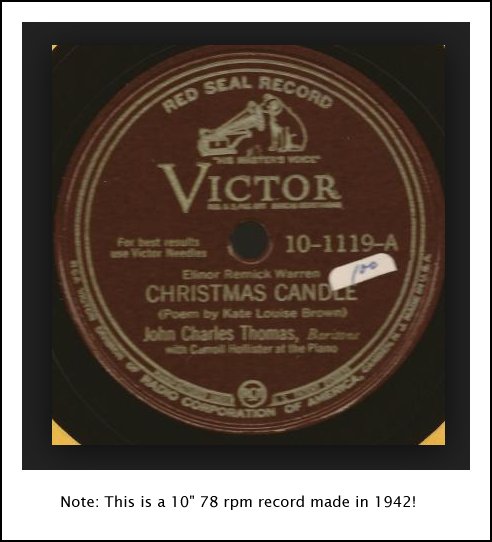 ERW: No! [Both have a huge laugh] No
thank you! But I think records are good. They certainly help performers.
I have a collection of records that have a lot of very famous old performers
both on the piano and singers, and I don’t think their standards were as
high as those today. It’s been a growing thing all the time.
ERW: No! [Both have a huge laugh] No
thank you! But I think records are good. They certainly help performers.
I have a collection of records that have a lot of very famous old performers
both on the piano and singers, and I don’t think their standards were as
high as those today. It’s been a growing thing all the time.
BD: Technically?
ERW: Not only
technically. Of course that’s training in itself, but I think the standards
are higher. It’s fabulous what they are doing now. I think they’re
marvelous.
BD: If they’re
getting better technically, are they getting better musically?
ERW: Some of
them are, yes, but not all of them. You can’t say they are or they
are not, but certainly the growth in the mainstream has been, yes.
It grows all the time. I’m an optimist, you know.
BD: Are you optimistic
about the whole business of music?
ERW: Well, not
the business side of it, obviously. But I certainly am about music and
the growth of music and the support of it. It’s been my life, and that
of my family.
* *
* * *
BD: When you’re
getting a new idea for a composition, does it immediately spring to your mind
full-blown, or do you have to work on it a bit?
ERW: Usually
something springs to me. It may not be the beginning; it may be a main
theme. Something will come and then you get thinking about it.
It’s like making a tapestry. It develops as you go along, and one path
leads to another. It’s so hard to describe. It sort of fills
spaces in a way.
BD: Are you conscious
of time in your pieces — how long a piece will last,
or how long you intend it to last?
ERW: Oh, no.
I just have to do what seems to come to me. I know that some of mine
have been a little long, but these are the bigger works.
They’re going to be to larger productions because it’s more expensive
if you involve a chorus and an orchestra and solo singers. But you have
to write the way you feel.
BD: Is that the
advice you have for young composers — to write the way you feel?
ERW: That the
most important thing. You really have to feel it. You can’t think
you’re going to write a sonata and sit down and write in the sonata form unless
you have an inkling of it and some feeling. It’s very hard to analyze
a thing like that, but you have to have a lot of feeling for it to have a
successful composition. You can’t just write this or that and have
a success unless it attaches onto your heart and your mind and your whole
being.
BD:
When you’re writing for chorus, do you specify the size of the chorus you’d
like perform it?
ERW: No.
There are some that really have to have a fairly large chorus to be effective,
but it depends on the scope of work is that you’re writing, and what you’re
setting. Some can have just twelve people, you know, or even just a
quartet! It just depends what you’re setting, what the magnitude is.
But I don’t think there’s any use in saying you have to have a certain number
of people. Sometimes choruses are understaffed, and yes, sometimes there’s
too many. I know one conductor said to me that he conducted a concert
of massed choirs where there were 300 in the chorus. Of course that
was 200 too many! You cannot get the nuances and the control that way.
You can overdo it as you can in anything. But these groups that come
together serve their purpose because they’re leading to new avenues, and
it’s a thrill for them to hear all the people sing. But there are other
things that would be of a small scope that would be impossible to have a
huge chorus do effectively.
BD:
Do you have any expectations of the audience that comes to hear your music?
ERW: Well, I
hope they like it! [Both have a huge laugh] Audiences are generally
much better than they used to be because they have expanded in their taste,
and the more they hear, the more they’re going to develop and enjoy it.
I don’t mean just of my music, but music in general. There are so many
facets to consider, but I can’t sit down coldly and analyze them. I
have to go by my feelings so much. I’ve never set a poem that I didn’t
really love and really feel for. I’ve never written anything that I
didn’t really feel deeply, and feel things about it and devote my time and
my life to it. It’s obviously with me.
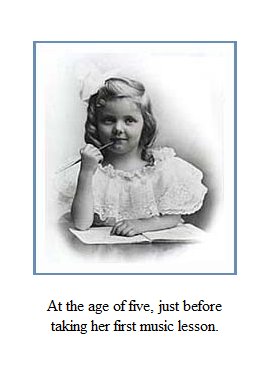 BD: You say you began composing at aged 5.
That means you’ve been involved in music now for all of your life.
BD: You say you began composing at aged 5.
That means you’ve been involved in music now for all of your life.
ERW: Well, that
was child stuff. But even so, I had very musical parents and not parents
that pushed me ever. They were very supportive.
BD: In over seventy-five
years, what has been the most surprising or the most interesting thing that
you feel has happened?
ERW: [Laughs]
Oh, I haven’t been writing for seventy-five years, but I never really thought
about that.
BD: Then in composing
or in performing, has there been one thing that has stood out as being surprising,
that you didn’t think would happen?
ERW: I’d have
to think about that. I don’t know. [Pauses a moment] No,
I don’t think so. Sometimes when I’ve heard a very new, really experimental
work I’ve been a little surprised, and then I’ve heard it again and it wasn’t
so surprising. Then finally it becomes just something that you love...
well, sometimes it does and sometimes it doesn’t. But it will grow on
one if it is new and surprising and it’s good and it’s sincere. Then
it opens new avenues of listening and of understanding and creativity.
BD: Do you feel
that concert music works well on the television?
ERW: Well, it
isn’t the same, of course, as live performances. Nothing can replace
that. However, it’s so wonderful to have this opportunity to hear fine
music on television. That’s a marvelous thing. It enlarges the
audiences by millions more than in a concert hall, and people enjoy it very
much. A lot of people who didn’t listen to good music have grown to
love it through truly fine great performances that are given by orchestras
and concerts on television. That’s all I listen to on television...
except a little news! [Laughs]
BD: Do you feel
that you are part of a lineage of composers?
ERW: I never
thought about that! I never really thought about where I stand.
[She laughs] That’s something only time can tell.
BD: But I assume
you expect your music will last?
ERW: I hope so.
Every composer does, but that isn’t why you write. You’re not writing
for the sake that you’re hoping that it will last, hoping that you’ll have
these successes. You’re writing because it’s something you love to do,
and you want to do it. It is expressing your life. Everybody has
some way of expressing themselves, or should have, and they’re happier if
they do. For some it’s writing books, for some it’s being golfers or
tennis players. There are many, many ways of expressing what one wants
to do in their life. Mine is just in music, and I’ve love it.
I don’t think that is something you do and stop. That’s part of life.
BD: Yes, you
don’t hear of too many retired composers!
ERW: No, I don’t
think you retire. Why should you retire? As long as you have the
ideas and the ability and you enjoy it you should continue to do it.
I’ve been very, very fortunate to have had many very good performances.
Not only do you learn a lot by performances but it’s something that makes
you want you do more.
BD:
What is next on the calendar for Elinor Remick Warren?
ERW: Well, I
guess more of the same I hope... but not the same, you know! I hope
it grows as I go on. I’m just now finishing up another piece, and I’ve
been consulted about these recordings. That’s the newest thing I’ve
done. And I have ideas for future things. I will always love
writing for choruses. That’s one of my favorite ensembles probably
because I’ve had an opportunity to understand choral writing so much, and
now hearing so such wonderful performances. Being led into that avenue
was a good idea. I love writing mostly for chorus and orchestra, and
of course the songs too. Although I am a pianist and am used to it
and have done lots of concerts, I’ve not written hardly anything for piano.
BD: It’s been
fascinating speaking with you. I learned a great deal about you and
about your music, and about your ideas.
ERW: Well, it’s
awfully nice to talk with you, Mr. Duffie. I’ve appreciated your interest
very much, and your co-operation. I hope I haven’t been too vague with
my answers.
BD: [Re-assuringly]
No, no, this has been just fine!
ERW: I don’t
think I’m terribly analytical. I do try to analyze my work, and that’s
why I’m a tinkerer because I do try to improve it. I often put things
away. In fact, in nearly all my composing I will write spontaneously
and be so excited, and then I’ll put it away and go back to it later.
BD: We’re very
fortunate that you’ve been able to commit all of this to paper, and then bring
it to performance.
ERW: I’ve been
very fortunate in so many ways, and I am very, very grateful. But you
have to work all the time to be happy. I really do think that, even
though it sounds awfully Pollyannaish. If you find what you want to
do, you never finish.
© 1987 Bruce Duffie
This conversation was recorded on the telephone on February 28, 1987.
Portions were broadcast on WNIB in 1990, 1995, and 2000. Spoken quotations
from this conversation were used aboard Eastern Airlines during their in-flight
musical programming for two months beginning in November, 1988. Spoken
quotations were also used in Song of America, a Radio series produced
by Miriam Lewin, Segment #9, "There is no Gender in Music" March 2012.
This transcription was made in 2016, and posted on this website at that time.
My thanks to British soprano Una Barry for
her help in preparing this website presentation.
To see a full list (with links) of interviews which have been transcribed
and posted
on this website, click here. To
read my thoughts on editing these interviews for print, as
well as a few other interesting observations, click here.
* * * *
*
Award -
winning broadcaster
Bruce Duffie was with WNIB, Classical
97 in Chicago from 1975
until its final moment as a classical station
in February of 2001. His interviews have
also appeared in various magazines and journals
since 1980, and he now continues his broadcast series on
WNUR-FM, as
well as on Contemporary
Classical Internet Radio.
You are
invited to visit his website for more information
about his work, including selected transcripts
of other interviews, plus a full list of his
guests. He would also like to call your attention
to the photos and information about his grandfather,
who was a pioneer in the automotive field more than a century ago.
You may also send him E-Mail with comments,
questions and suggestions.
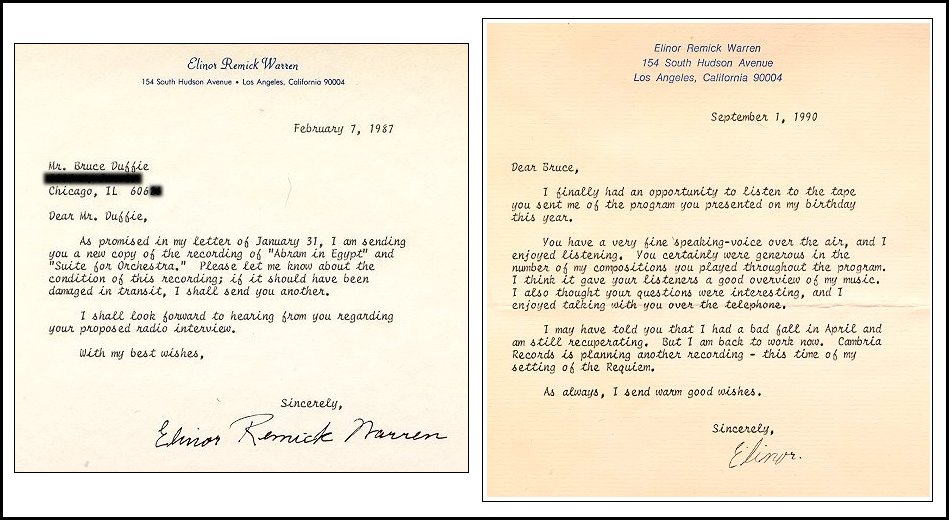
 ERW:
Oh, I think so, yes. Maybe that’s a good thing but I don’t like it any
more than I would like any kind of segregation. I’m very proud to be
a woman but I don’t like to be viewed just as a ‘woman composer’.
ERW:
Oh, I think so, yes. Maybe that’s a good thing but I don’t like it any
more than I would like any kind of segregation. I’m very proud to be
a woman but I don’t like to be viewed just as a ‘woman composer’. ERW: You have to have inspiration to be a good
composer. I felt it so much that there were times when I’ve been writing
— even when my children were little so I had lots of other demands
— that I could hardly wait for the next day to begin working
again. There was something I felt that was inside that I had to express,
that I wanted to write. It’s always been a joyful experience for me.
ERW: You have to have inspiration to be a good
composer. I felt it so much that there were times when I’ve been writing
— even when my children were little so I had lots of other demands
— that I could hardly wait for the next day to begin working
again. There was something I felt that was inside that I had to express,
that I wanted to write. It’s always been a joyful experience for me. BD: Let’s talk about singers. You write
a lot for the voice...
BD: Let’s talk about singers. You write
a lot for the voice...
 ERW:
No, it wasn’t made in Israel. It wasn’t with the same group entirely
either, but it was under Roger Wagner, who did it in Israel. But I had
nothing to do with the recording.
ERW:
No, it wasn’t made in Israel. It wasn’t with the same group entirely
either, but it was under Roger Wagner, who did it in Israel. But I had
nothing to do with the recording. BD:
Do you feel that music is art or entertainment?
BD:
Do you feel that music is art or entertainment? ERW: No! [Both have a huge laugh] No
thank you! But I think records are good. They certainly help performers.
I have a collection of records that have a lot of very famous old performers
both on the piano and singers, and I don’t think their standards were as
high as those today. It’s been a growing thing all the time.
ERW: No! [Both have a huge laugh] No
thank you! But I think records are good. They certainly help performers.
I have a collection of records that have a lot of very famous old performers
both on the piano and singers, and I don’t think their standards were as
high as those today. It’s been a growing thing all the time. BD: You say you began composing at aged 5.
That means you’ve been involved in music now for all of your life.
BD: You say you began composing at aged 5.
That means you’ve been involved in music now for all of your life.